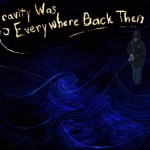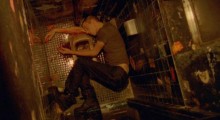Post-Production
Filmmaking - Post-Production
-
Brent Green on Gravity Was Everywhere Back Then

Brent Green is a self taught filmmaker and artist who lives and works in the Appalachian hills of Pennsylvania. His unique hand drawn and stop motion short films have played venues including the Sundance Film Festival, the L.A. Film Festival and the International Film Festival Rotterdam. He was also one of Filmmaker’s 25 New Faces in 2005. Recently he wrapped up filming his first feature-length film, Gravity Was Everywhere Back Then. Shot entirely in stop motion using human beings, the film tells the true story of Leonard and Mary Wood, two people joyously brought together but separated through forces far […]
-
The Map

Alice Munro wrote a short story once called “Deep Holes,” and it’s as fitting a title as any when one considers her body of work. Munro has made a career out of writing the same short story over and over again, but because that story is shot through with an incredible amount of depth, with endless bottoms of nuance and complexity and minor shifts and adjustments each time, it constantly amazes. Jonathan Franzen (who himself rewrote his 2001 classic novel The Corrections as the even better Freedom), reviewing Munro’s 2004 collection Runaway, nailed it: I like stories because it takes […]
-
Cold Weather and Everything You Wanted to Know About Genre

Honestly, what the hell is up with genre these days? It’s a tricky thing to get a handle on, but we all have an idea of what’s happening in the independent film world: as production financing has dried up in a world where cinema is, simply put, not generating as much revenue as it used to, independent filmmakers who might be more at home making “art” flicks have decided to mix their interests with more familiar genre narratives. Catfish, which generated more intellectual-thought-content-per-minute than any other 2010 release, was sold as (and contained elements of) a Blair Witch-esque thriller, set […]
-
The Perfect Swan
(Editor’s Note: This essay contains spoilers.) In literature or in oratory, where rhetoric arose from, it’s somewhat difficult to separate the argument’s mode of persuasion from its substance. In order to make an entirely skilled rhetorical point, the writer or speaker will have to present a series of assumptions and assertions, facts and hypotheses, in such a way that makes the argument’s substance apparent. That’s why literature lends itself to the intellectual: it’s founded upon a progression of ideas. Cinema is often referred to as a different kind of linguistic medium (the “language of film”), but a linguistic one nevertheless, […]
-
Color Enhancements

Roberto Quezada-Dardon learns why digital intermediate has become an essential tool for filmmakers. -
A Movie is Like a Person: Enter the Void

“Then, too, there is always something other than content in the cinema to grab hold of, for those who want to analyze,” Susan Sontag wrote in her seminal essay Against Interpretation. “For the cinema, unlike the novel, possesses a vocabulary of forms — the explicit, complex, and discussable technology of camera movements, cutting, and composition of the frame that goes into the making of a film.” Toward the very end of the same essay, she advocated, “The function of criticism should be to show how it is what it is, even that it is what it is, rather than to […]
-
Things That Seem Real, Part 3 : Catfish And Fakery

Editor’s Note: Part one of this essay, “Things That Seem Real: A Three-Part Essay on Catfish and Other Movies,” appeared Tuesday on the site and can be read here. Part Two appeared yesterday and can be read here. These essays contain major spoilers regarding the film Catfish. Catfish and Fakery. Catfish has some major truth-problems. Major. Like, plot holes big enough to drive a truck through. The stirrings of suspicion began instantly after its Sundance 2010 premiere. On January 30th, reporting from Sundance, Indiewire’s Bryce Renninger wrote that “Over the week since its premiere, though, many critics and audience members […]
-
Things That Seem Real, Part Two: Catfish and Fantasy
Editor’s Note: Part one of this essay, “Things That Seem Real: A Three-Part Essay on Catfish and Other Movies,” appeared yesterday on the site and can be read here. These essays contain major spoilers regarding the film Catfish. Part Two: Catfish and Fantasy Over the course of an eight-month relationship that contained no physicality, Nev and Megan stayed in touch constantly. Using email, Gchat, Facebook walls, text messaging and phone calls, they pushed the boundaries of what are commonly understood to be the limits of an online-only relationship. Megan tells Nev about her family and the horses she takes care […]
-
Things That Seem Real, Part One: A 3-Part Esaay on Catfish and other movies

Editor’s Note: The following essay contains major spoilers about the film Catfish. Part One: Catfish and Reality In the movie, the 14-year-old boy tells the school therapist that he likes to watch “little clips” on the computer, little videos. He describes them as “little clips of things that seem real.” Earlier in the film, we saw a montage of YouTube clips, from a cat playing piano to Saddam Hussein being hung to a baby laughing. Later in the film, the boy sees two girls die from a drug overdose right in front of him. How real that event does — […]
-
Do the Yam: Astaire & Rogers: The Complete Works
“I wanted to be a dancer,” says Fred Astaire, wheezing out a tune on a harmonica with his gangly frame draped casually over a medical couch. “Till I was psychologized.” Astaire plays doctor—a shrink, of all things—in Mark Sandrich’s Carefree (1953), a little-known screwball comedy gem as antic and goofy as Howard Hawks’ Bringing Up Baby (1938) with dance. And what dance! Accompanied by an Irving Berlin score, Astaire and Rogers are at the top of their game in the tale of a therapist (Astaire) who must find the root of the commitment phobia that plagues his new patient (Rogers). […]
